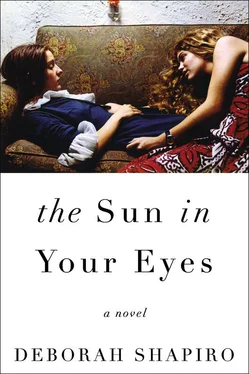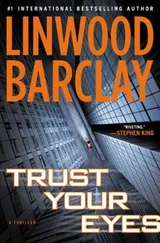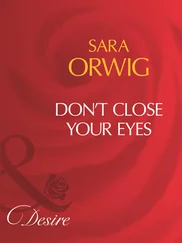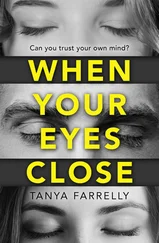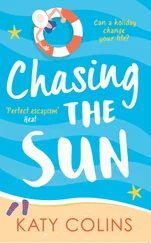The guests spent the night and in the morning, Linda told us all about the dream she’d had in which she slept with her father. Which sounds like the kind of thing you say to shock someone, but Linda spoke with unfiltered openness and a complete lack of self-consciousness. “The thing is,” she said, “it was really good!” I didn’t think she was aware of the effect it might have on her daughter. But that right there was Lee’s problem with her. Whether it was blithe lack of forethought or knowing disregard, it hurt. I was the only one who saw Lee’s face when Linda said that: like finding out a secret note of yours had fallen into the wrong hands. What must it have been like to have a father whom women recollected with yearning and faintly dirty smiles, a man whose seductive qualities never ever diminished? If he’s your father and yet you never knew him, really, does he seduce you, too?
“Was it really your father or was it a stand-in?” the British actress asked.
“It was really my father. He called me Lindy. He smelled like Aqua Velva and Chock Full O’Nuts.”
Linda’s candor and freedom, the space she luxuriously floated in, amazed me. My own parents seemed so contained in comparison. They had done such an excellent job of shielding from me their inner lives that I had naturally concluded they didn’t have very rich or complicated ones.
Some months later, when Linda asked us all out to dinner one Parents’ Weekend, I excitedly anticipated introducing my mother and father to Linda. She would dazzle them, would make them see life didn’t have to be so small.
Would the Felds — Jonathan, a dermatologist, and Natalie, a middle-school language arts teacher — have been able to command the most inviting table in the restaurant or would they have had to wait for two hours like everyone else only to be seated by the bathroom? When it came to appetizers, my mother ordered the simple mixed-greens salad while Linda ordered several plates of the “exquisite” zucchini blossoms she’d had here the last time she was in town, along with something involving fennel and a citrus drizzle.
“The zucchini blossoms actually are really good here,” Lee said to my mother, as though apologizing.
“They sound delicious,” said my mother, warming to Lee.
“I’ve read about this place,” said my father. “People say it’s top notch. I’ve always meant to make a reservation.”
“Really?” I said. My father either didn’t hear or pretended not to as he focused on the wine list, choosing a bottle that cost three times what he typically spent on the special occasions when he drank wine. When it arrived, he deferred to Linda, who raised her glass and said, “To our daughters, our incandescent girls.”
“Hear! Hear!” said my father, and he clinked Linda’s glass first while my mother and Lee exchanged a look: yes, okay, sometimes Linda gets it right.
The talk turned to what we’d done with our respective days. Linda and Lee had gone to lunch with an old friend of Linda’s who now happened to be the dean of alumni relations. “She used to handle PR for me when I was just starting out with the line,” said Linda. “And she was perfect because she thinks in sound bites. Half the time she made me feel like a rambling old loon, but that’s what I was paying her for.” My parents and I had been to a panel discussion, “Illness and Creativity,” led by Patricia Driggs, who had joined the faculty that semester and had just come out with her latest book, a memoir about living with fibromyalgia.
“I thought she was remarkable,” said my mother. “So smart. And off the cuff like that — I’ve always admired how, in her writing, she can distill very complex ideas into such elegant sentences. But she speaks that way. You were talking about sound bites — it’s the opposite of that. The deep complement to that.”
“Oh God, I’m sorry, but eeecch, Patti Driggs?”
Prompted by their inquiring looks, Linda elaborated. Patti was her nemesis. They had come of age around the same time, in the same place, circling each other at parties in the canyons of Los Angeles, accepting dinner invitations from the same hosts, turning up at the same clubs. They were friendly and Linda even felt a bit sisterly toward Patti. Thin and birdlike Patti, her nerves as vibratory as a tuning fork. She once told Linda she often found herself compulsively counting headlights on cars at night. To not count them would open her up to an unnamable terror. And yet, Patti was steely. It was Patti who made the most acute, withering comments, or she would listen more intently than empathically, like an aural snare trap. Linda liked having tense and pitiless Patti around. Or so she thought.
Patti was writing sharp essays and journalistic reports about life in Los Angeles that would eventually be compiled into a much-lauded, much-imitated volume. It was Linda who helped facilitate Patti’s profile of Jesse Parrish, persuading Jesse that Patti wouldn’t lazily paint him as the country boy who couldn’t resist the glittering temptations of the city. She might, as others had, contrast his sweetness with his swagger, describe his music in terms of purity and corruption. Write about how polite he was, as if that were exotic. But Linda convinced Jesse that Patti would somehow get it just right. Imagine Linda’s reaction, then, when she read Patti’s piece, which contained (blessedly, perhaps) only one reference to her: “His wife, a model from Mamaroneck, appears by the pool and asks if Jesse would like to wear the blue caftan this evening or the gold and if he wants the gold caftan, he should really wear the purple velvet pants, oh, but wait, the purple velvets are at the cleaners. She pauses, corrects herself: aubergine, not purple. The mood is very serious.”
Patti went on to write novels ( Dispatches from the End, which established her voice as that of a generation, followed by Managing by Walking Around ) and two plays — one a “vital, scabrous take on sexual harassment in academia” and the other a “hilarious descent into the dark heart of a deteriorating marriage” according to the introductory leaflet I’d been handed at the lecture hall. She also wrote an indispensable book on photography.
Linda never forgave Patti for the early betrayal. What rankled Linda most was Patti’s duplicity. Patti would be duplicitous even in her insanity. If Patti were to really lose it one day, as she feared she would, she would only go crazy enough to write about it in a bestselling fashion; she would literally be of two minds, never batshit enough not to be intelligible, shrewd, and marketable.
“You’d like her to have a complete and total breakdown?” my mother asked.
“I’m not wishing it on her. But it would finally be honest. I just get so tired of her moral authority. She writes a book called Dispatches from the End and everyone goes on about how significant it is, how powerful a portrait of anomie in our apocalyptic times. And I’m thinking, it sounds like a book about taking a shit. But even after all this time, it hasn’t changed. It’s not just that she made me look like an idiot all those years ago. She didn’t even really get Jesse, who, by the way, never owned a pair of purple velvet pants. Excuse me, aubergine. Patti loved him, no doubting that, and I’m not going to get catty, but it was like she wanted to instruct him on how to be a better person. He didn’t need her instruction. Other people criticized him for being out of it, for not being political enough, like he only cared about himself. But you know how young men write those songs and sometimes you can’t tell if they’re about a girl or Jesus or heroin? Well, Jesse would cover a protest song, and it would come out sounding like it was about love, about getting your heart broken. He had this vulnerability, this really aching feminine quality, which is just, my God, so sexy in a man. And it was all there when he sang. Right there. He’s with you, you’re with him. I think that’s what makes him timeless. What’s that T. S. Eliot line about news that stays news?”
Читать дальше
